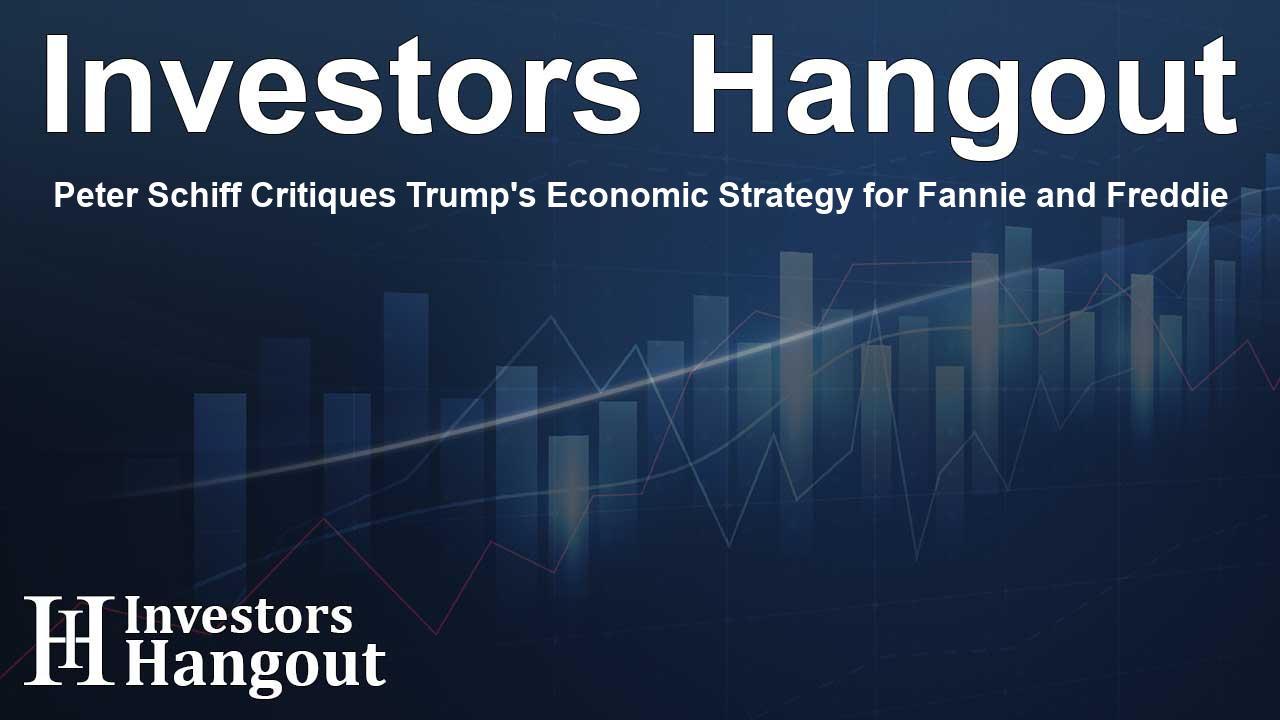Peter Schiff Critiques Trump's Economic Strategy for Fannie and Freddie

Concerns over Trump's Plan for Fannie Mae and Freddie Mac
Economist Peter Schiff has raised significant alarms regarding President Donald Trump’s proposal for a unified listing of the Federal National Mortgage Association or Fannie Mae and Federal Home Loan Mortgage Corp. or Freddie Mac. Schiff believes that this initiative may lead to economic dangers reminiscent of those encountered during the 2008 Financial Crisis.
Historical Context of Fannie Mae and Freddie Mac
In a recent statement, Schiff highlighted the origins of Fannie Mae, established by President Franklin D. Roosevelt in 1933. Later, President Lyndon Johnson transformed it into a government-sponsored entity in 1968—though it initially operated without a government guarantee. Correspondingly, Schiff pointed out that Freddie Mac was initiated by Richard Nixon in 1970, primarily to serve as competition to Fannie Mae, allowing both entities to purchase non-FHA insured mortgages.
Investors' Misplaced Trust
Shifting focus to the current economic landscape, Schiff criticized investors for their unwarranted trust in government backing of these mortgage giants. Although warnings were issued, he acknowledges that their belief in an “implicit guarantee” became accurate when both companies were placed under government conservatorship after the crisis of 2008.
Implications of Trump's Proposal
Schiff asserts that Trump’s strategy could solidify this implicit guarantee into an explicit one. "The administration claims that the firms will keep their ‘implicit’ guarantees," he explained, "but once the government formalizes that guarantee, it stops being implicit and becomes explicit," potentially marking a dangerous shift in policy.
Potential Economic Fallout
Expressing his substantial worries, Schiff stated, “The impact of Fannie and Freddie prior to 2008 will appear minor compared to the repercussions they might inflict if they are released from conservatorship as Trump proposes.” He believes that this change could be recorded as “one of the worst economic decisions ever made by a U.S. president.”
Moral Hazards in the Financial Sector
Recently, Schiff has cautioned that merging Freddie Mac and Fannie Mae could create a significant moral hazard, larger than the one that existed before the last financial crisis. He fears that this merger may enable reckless behavior by investors, as confidence in government backing becomes more ingrained.
Voices of Support for the Plan
In contrast, hedge fund manager Bill Ackman, a major shareholder in both Fannie Mae and Freddie Mac through Pershing Square Holdings, has publicly supported Trump’s plan. Ackman suggests that merging these companies could yield efficiencies that might lower mortgage rates, thereby softening the economic landscape.
The Balance of Risk and Reward
Ackman has argued that a merger would lighten the burden of government oversight since it would concentrate regulatory scrutiny to a single institution. This viewpoint raises critical questions about the overall stability and risk associated with such a unification under government guidance.
Conclusion: What Lies Ahead?
As the debate around Trump's strategy for Fannie Mae and Freddie Mac unfolds, the economic implications they carry cannot be overstated. Analysts and investors alike will be closely monitoring how these moves may shape the future of the housing market and overall economy.
Frequently Asked Questions
What are the main concerns with Trump's plan for Fannie Mae and Freddie Mac?
Peter Schiff warns that the plan could create significant economic risks and formalize an implicit guarantee that may lead to reckless financial behavior.
How did Fannie Mae and Freddie Mac originate?
Fannie Mae was established in 1933 by Franklin D. Roosevelt, while Freddie Mac was created in 1970 by Richard Nixon to add competition in the housing market.
What is a moral hazard in the context of this discussion?
A moral hazard refers to the risk that parties insulated from risk may behave differently than they would if they were fully exposed to the risk, potentially leading to risky financial practices.
What are the potential benefits of merging Fannie Mae and Freddie Mac?
According to supporters like Bill Ackman, synergies from the merger could lead to lower mortgage rates and streamlined government oversight.
What historical events does Schiff reference regarding Fannie Mae and Freddie Mac?
Schiff draws comparisons with the financial crisis of 2008 when both entities were placed under government conservatorship and highlights the consequences of their operation without guarantees.
About The Author
Contact Owen Jenkins privately here. Or send an email with ATTN: Owen Jenkins as the subject to contact@investorshangout.com.
About Investors Hangout
Investors Hangout is a leading online stock forum for financial discussion and learning, offering a wide range of free tools and resources. It draws in traders of all levels, who exchange market knowledge, investigate trading tactics, and keep an eye on industry developments in real time. Featuring financial articles, stock message boards, quotes, charts, company profiles, and live news updates. Through cooperative learning and a wealth of informational resources, it helps users from novices creating their first portfolios to experts honing their techniques. Join Investors Hangout today: https://investorshangout.com/
The content of this article is based on factual, publicly available information and does not represent legal, financial, or investment advice. Investors Hangout does not offer financial advice, and the author is not a licensed financial advisor. Consult a qualified advisor before making any financial or investment decisions based on this article. This article should not be considered advice to purchase, sell, or hold any securities or other investments. If any of the material provided here is inaccurate, please contact us for corrections.
